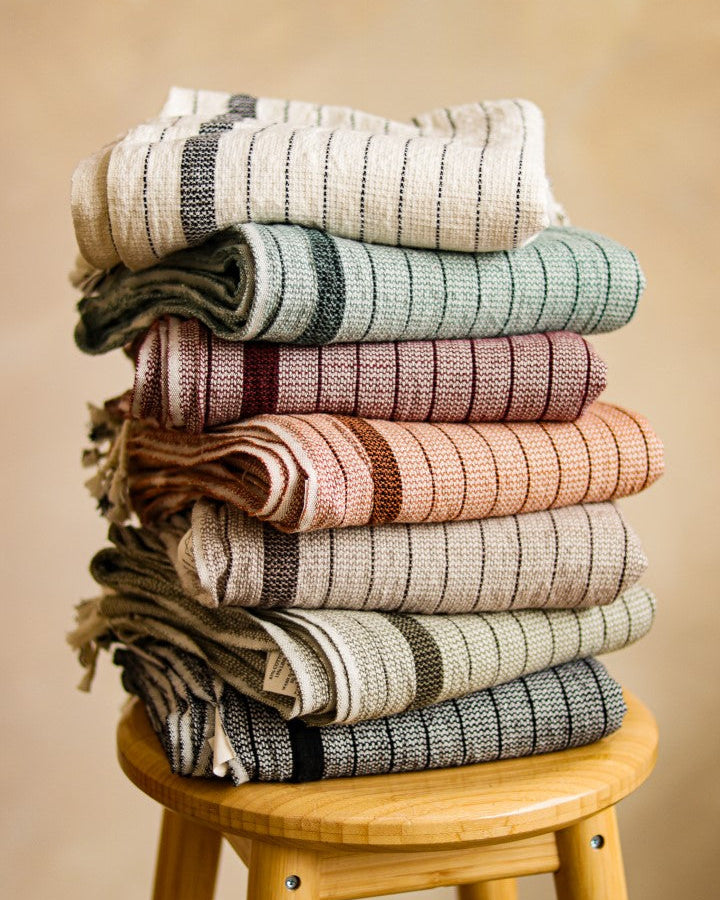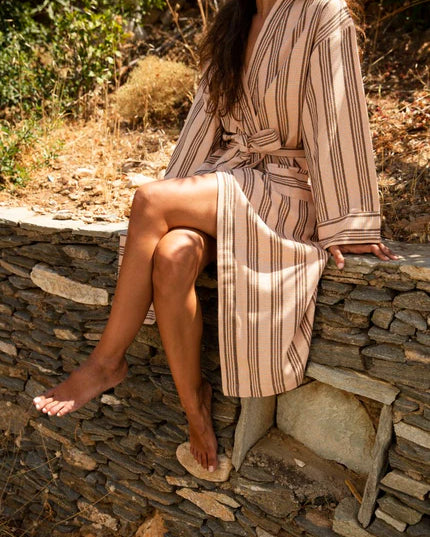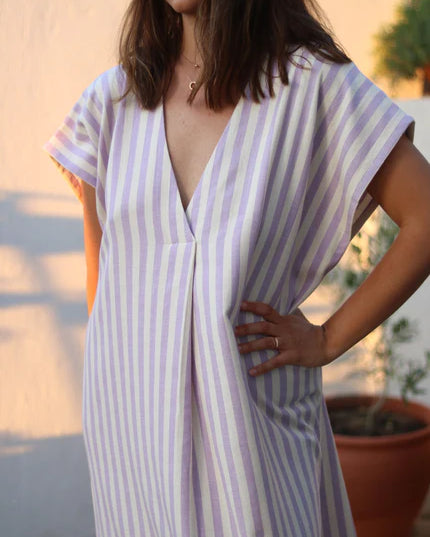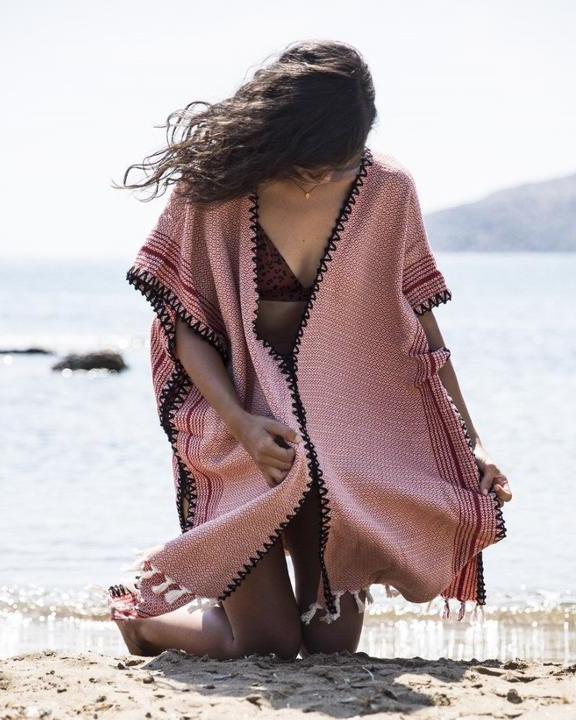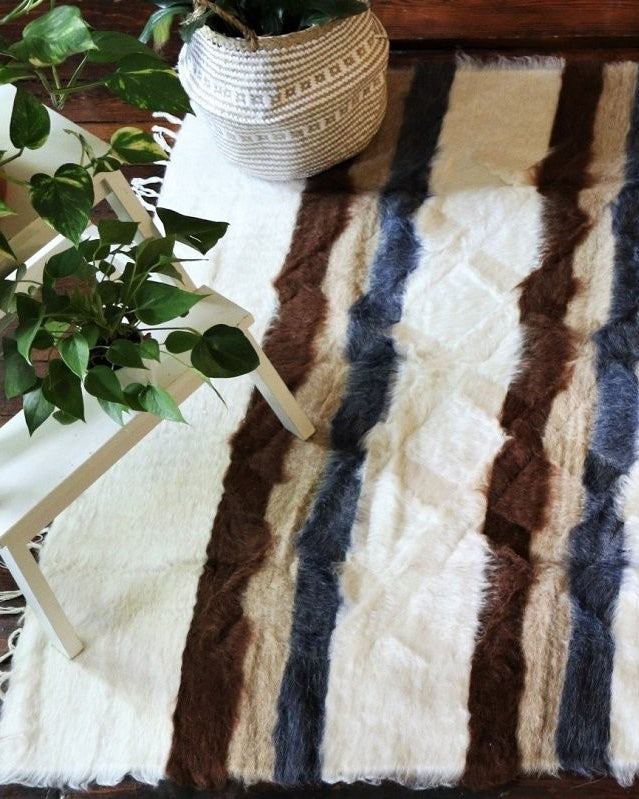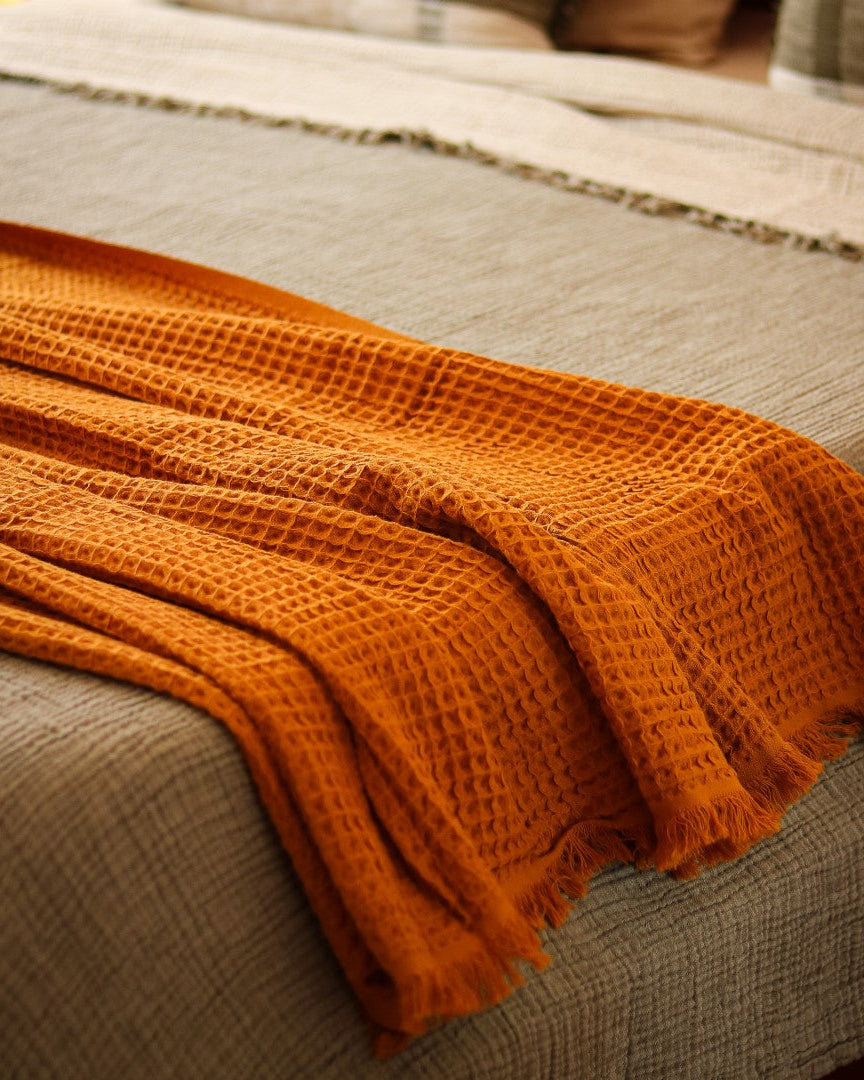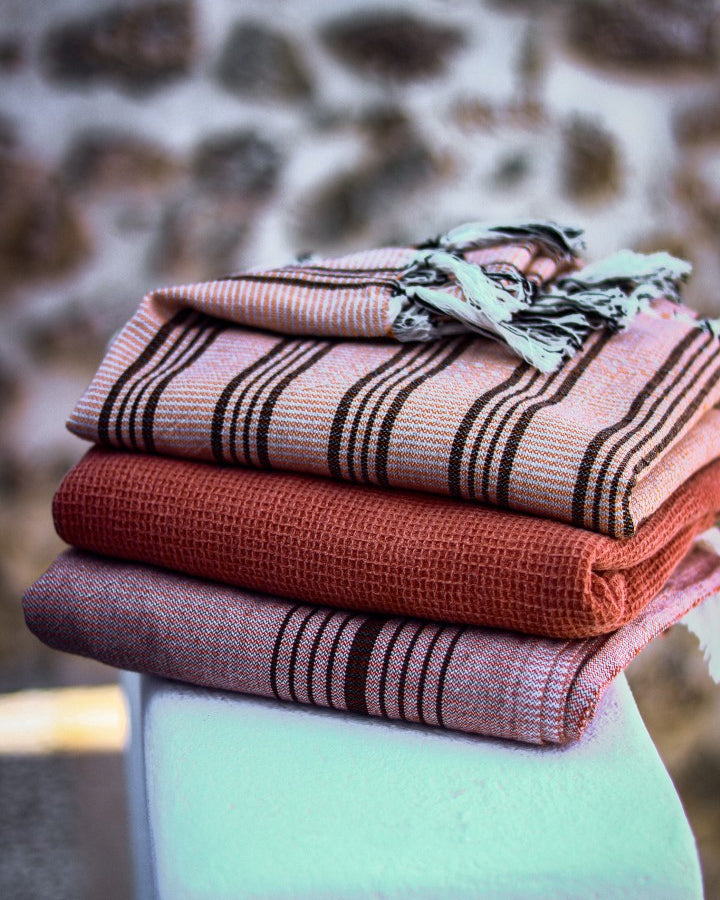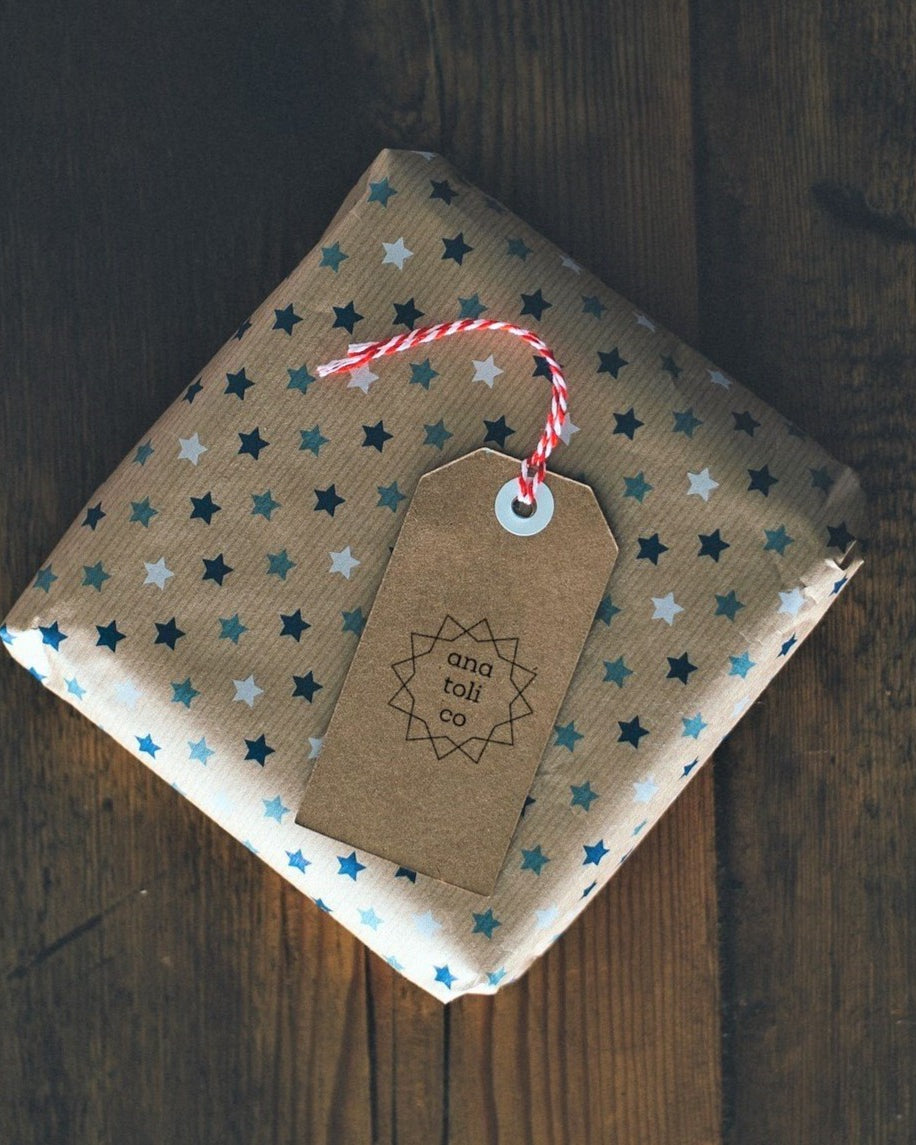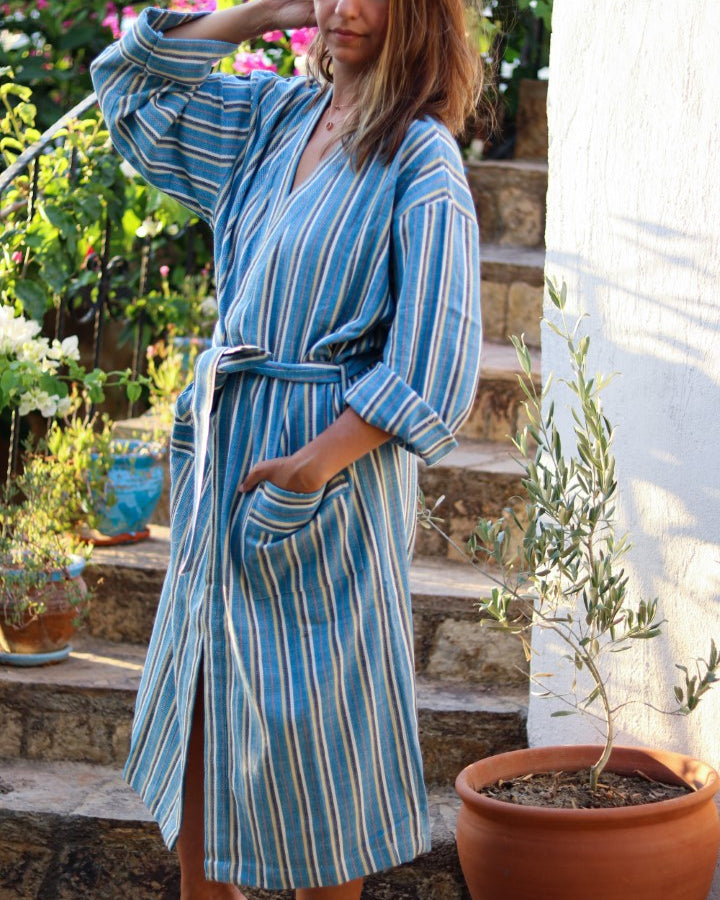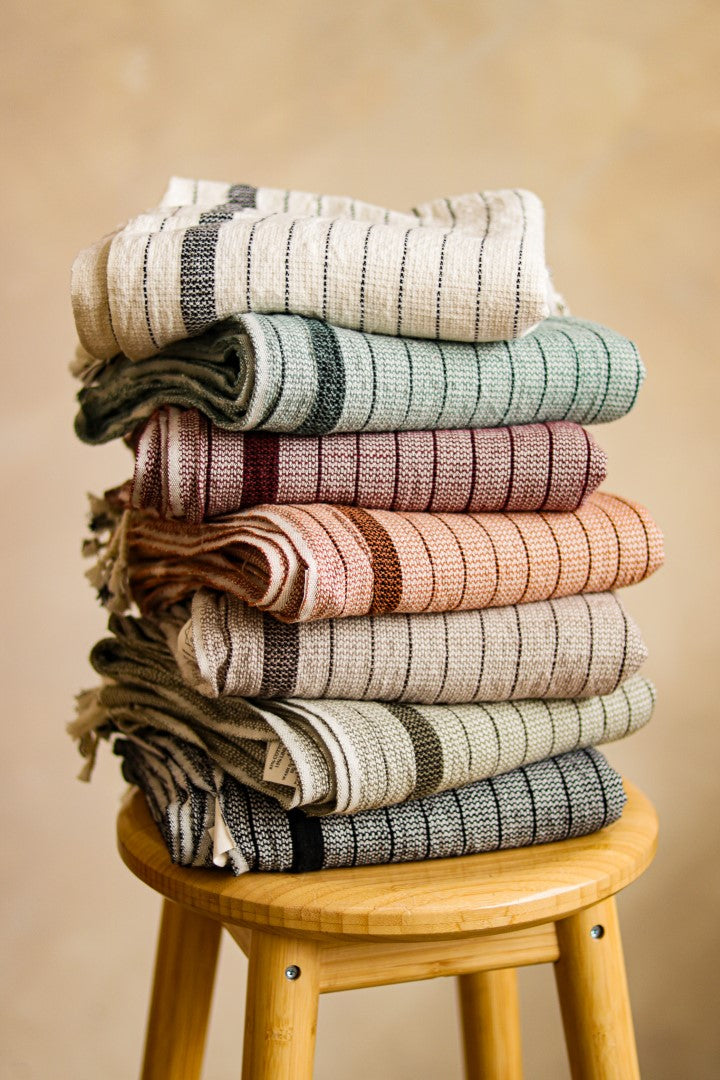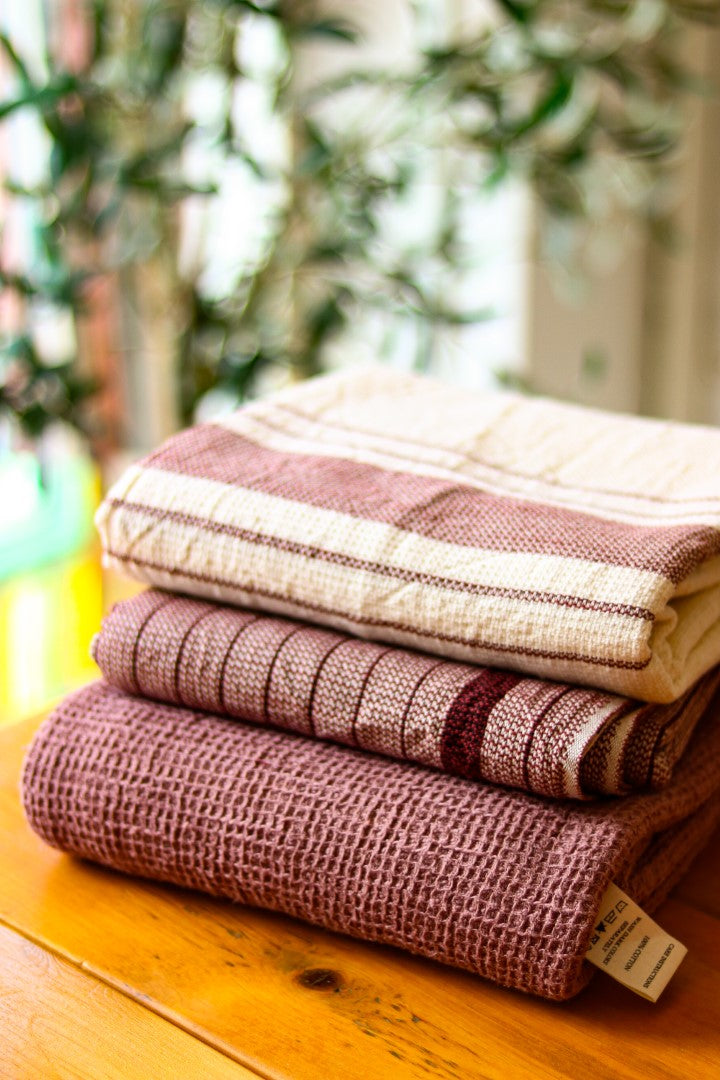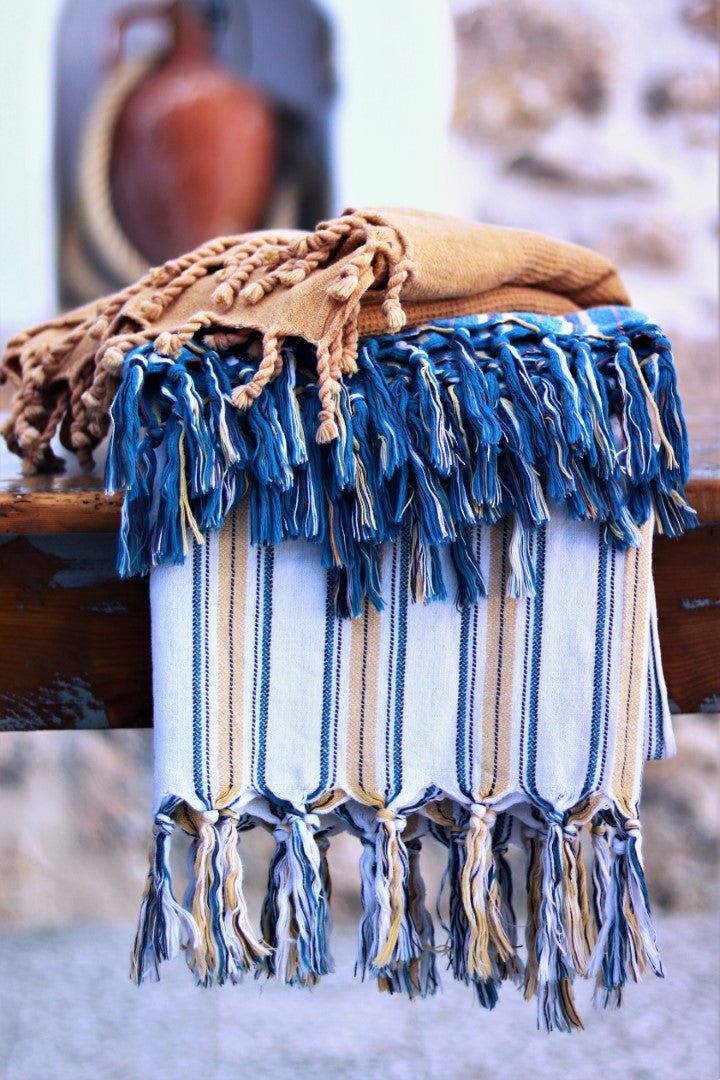When you’re standing at the crossroads of Turkish versus Egyptian cotton, the right path isn't about which one is "better" overall, but which one is better for you and what you need it for. It’s a classic case of purpose driving the decision.
If you’re after a towel that's lightweight and dries in a flash, especially in a humid bathroom, Turkish cotton is your champion. But if you’re dreaming of sinking into incredibly soft, plush, and deeply absorbent bed sheets or spa-quality bath linens, nothing beats Egyptian cotton.
So, Which Cotton Should You Choose?
Let’s be clear: one isn't definitively superior to the other. They've simply been perfected by nature for different jobs. The whole Turkish vs. Egyptian cotton debate really boils down to the product in your hands. Are you shopping for a bath towel that can keep up with daily use and resist that dreaded mildew smell? Or are you searching for bed sheets that feel like a silky, luxurious hug?
The magic of Egyptian cotton lies in its extra-long staple (ELS) fibers. These long, fine threads spin into exceptionally smooth, strong, and thirsty yarns. The result is a fabric that feels unbelievably soft, lasts for ages, and has a noticeable, premium weight to it.
Turkish cotton, on the other hand, is built from long-staple fibers that are just a touch shorter. This small difference gives the fabric a fantastic balance of softness and durability, but its real claim to fame is its tight, less absorbent weave. That might sound like a downside, but it’s actually a brilliant feature, allowing it to dry much more quickly and stay fresh.
The Bottom Line: Go with Egyptian cotton when you want maximum softness and absorbency, particularly for your bedding. Opt for Turkish cotton when you need something lightweight that dries fast, like bath, gym, or beach towels.
If you're diving deep into the world of bedding, this fantastic guide to choosing the perfect bed sheets is a great resource that breaks down different fabrics and weaves even further.
Key Differences At a Glance Turkish vs Egyptian Cotton
To make things even clearer, here’s a quick side-by-side comparison. It's a simple way to see how these two premium cottons stack up against each other on the features that matter most.
| Feature | Turkish Cotton | Egyptian Cotton |
|---|---|---|
| Fiber Length | Long-Staple | Extra-Long Staple (ELS) |
| Primary Benefit | Quick-Drying & Lightweight | Ultra-Soft & Highly Absorbent |
| Best For | Bath Towels, Robes, Beachwear | Luxury Bedding, Spa Towels |
| Feel | Soft and smooth, becomes softer with use | Exceptionally silky and plush from the start |
| Absorbency | Good absorbency, but less than Egyptian | Extremely high absorbency |
| Drying Time | Fast | Slower |
Ultimately, this table helps distill the choice down to a few key points. Think about your daily routine, your climate, and what you value most—plushness or practicality—and the right cotton will practically choose itself.
Exploring the Heritage of Each Fiber
To really get to the bottom of the Turkish vs. Egyptian cotton debate, you have to go back to the source. The specific place where cotton grows fundamentally shapes everything about it—from the length of its fibers to its natural strength and shine. We're not just talking about fabric; we're talking about agricultural legacies that have been refined over centuries.
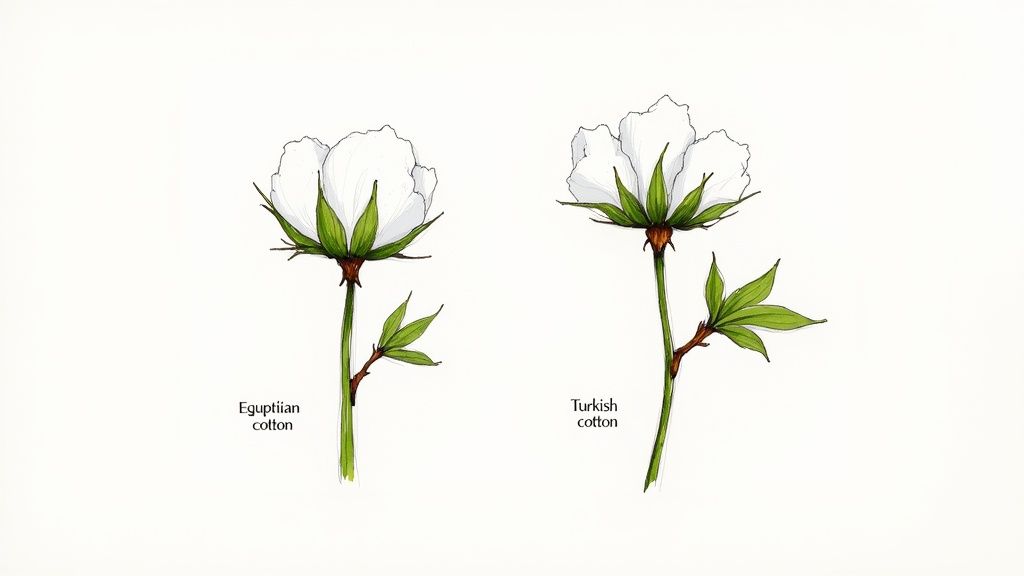
This geographical starting point is crucial. It’s the very reason why these two types of cotton feel and perform so differently, whether in a bath towel or a set of bedsheets. The unique climate and soil of each region cultivate fibers with distinct personalities.
The Nile River Valley Legacy
Egyptian cotton’s legendary status comes directly from the fertile Nile River Valley. This region’s perfect blend of consistent humidity, nutrient-rich soil, and abundant sun provides the ideal incubator for Gossypium barbadense, the plant that yields the world’s most coveted extra-long staple (ELS) fibers.
These fibers are incredibly long, typically measuring between 1 3/8 inches and 2 inches. That extra length is a game-changer. It allows them to be spun into yarns that are exceptionally fine, smooth, and strong. The end product is a fabric famous for its silky-soft touch and remarkable durability, which is why Egyptian cotton has long been the global gold standard for luxury textiles.
Cultivation in the Aegean Region
Over in Turkey, the story unfolds in the temperate climate of the Aegean region. This area is known for producing premium long-staple fibers. While a bit shorter than their Egyptian cousins, these fibers have their own unique advantages that make them highly sought-after.
The key takeaway is that Turkish cotton's structure is naturally less absorbent and has a subtle sheen, which translates directly into faster drying times and a lighter feel.
This quality is a direct byproduct of its growing environment. The fibers are strong yet smooth, resulting in a durable fabric that actually gets softer and fluffier the more you wash it. It hits that sweet spot between luxurious comfort and everyday practicality, making it a fantastic choice for items you use often and need to dry quickly. For a closer look at what makes it stand out, you can learn more about Turkish cotton.
A Detailed Comparison of Fiber Properties
When you get right down to it, the real difference between Turkish and Egyptian cotton isn't just about where it's grown—it's written in the very fibers themselves. The length, thickness, and structure of each cotton type dictate how the final fabric feels, how it performs, and how well it ages. These are the tiny details that make a huge difference in your daily life.
The single most important factor is staple length. Egyptian cotton is famous for its extra-long staple (ELS) fibers, which are longer and finer than just about any other cotton out there. This extra length means they can be spun into incredibly smooth, strong yarns with very few breaks or connections. Fewer connection points result in a fabric that's less prone to pilling, incredibly durable, and has that signature silky feel.
Turkish cotton is also a high-quality, long-staple cotton, but its fibers are just a bit shorter and thicker. This creates a yarn that is still very strong and durable, but with a different character. The result is a fabric prized for its unique balance of softness and a lighter, more airy feel.
Luster and Smoothness
That exceptional fineness of Egyptian cotton fibers is what gives the fabric its noticeable luster. When woven, those smooth, uniform yarns create a surface that reflects light evenly, producing a subtle, elegant sheen. It’s a big part of why Egyptian cotton sheets look every bit as luxurious as they feel.
Turkish cotton has a lovely natural sheen too, though it’s generally a bit softer and less pronounced. Its fibers create a fabric with a smooth, comfortable feel right from the start, and it has a wonderful way of getting even softer with every wash. Over time, it develops that perfect, lived-in texture that so many people love.
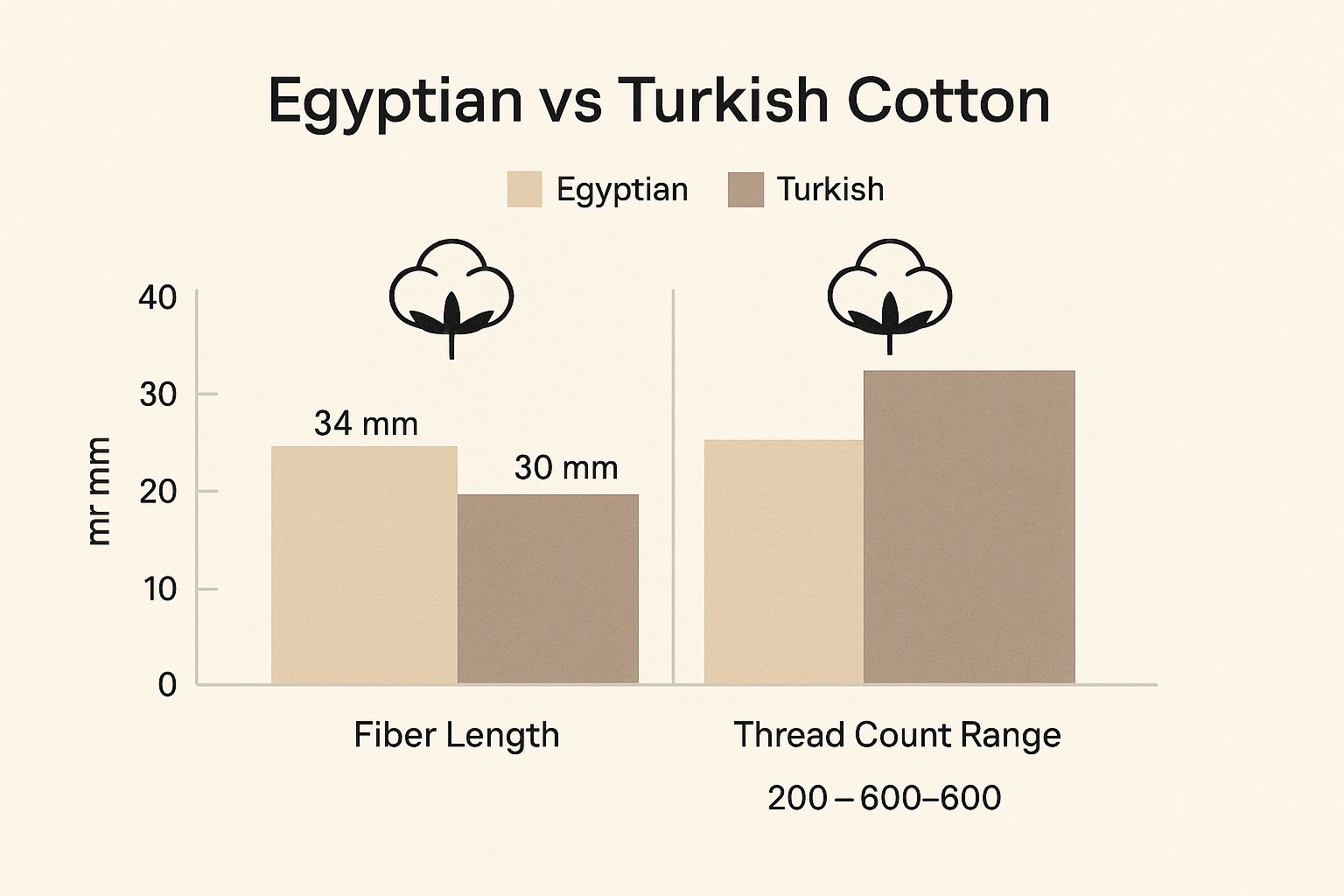
Absorbency and Drying Speed
This is where the practical differences really come into play, and it's often the deciding factor for people. Thanks to its dense and porous ELS fibers, Egyptian cotton is incredibly thirsty; it can soak up a huge amount of moisture. This makes for a wonderfully plush and absorbent towel that gives you that five-star, spa-like feeling.
The trade-off? Because it holds so much water, it takes a lot longer to dry. In a humid bathroom or for a towel that gets used multiple times a day, this can be a real downside.
Egyptian cotton’s dense fibers excel at absorption, creating plushness, while Turkish cotton’s structure promotes airflow for faster drying.
And that’s exactly where Turkish cotton has the edge. Its long fibers are naturally less absorbent, and they're often woven with a flatter, tighter loop. This construction makes the fabric absorbent enough to dry you off effectively but allows it to release moisture and dry out much more quickly. That’s why Turkish cotton towels are a fantastic choice for everyday use, gym bags, and travel—they resist that musty smell and stay fresher for longer.
To get a clearer picture, let's look at the hard data behind these two premium fibers.
Technical Property Breakdown: Turkish vs Egyptian Cotton
This table breaks down the key technical characteristics that define the performance and feel of each cotton type.
| Property | Turkish Cotton | Egyptian Cotton |
|---|---|---|
| Fiber Length | Long-Staple (LS): 1 1/8 to 1 1/4 inches | Extra-Long Staple (ELS): 1 1/4 to 2 inches |
| Fiber Diameter | Slightly thicker, creating a stronger yet lighter yarn | Finer and silkier, creating a denser, smoother yarn |
| Absorbency | Moderately absorbent | Highly absorbent |
| Drying Time | Fast | Slow |
| Strength | Very strong and durable | Exceptionally strong and resistant to pilling |
| Luster | Soft, natural sheen | High, elegant luster |
| Best For | Towels, bathrobes, everyday bedding, warm climates | Luxury bedding, high-end sheets, spa-quality towels |
As you can see, the choice isn't about which one is "better" overall, but which one has the specific properties that are better for you and your needs.
Real-World Performance and Durability
The technical specs of cotton fibers are one thing, but how they actually perform in your home is what really counts. When you pit turkish cotton vs egyptian cotton against each other in real life—like grabbing a towel after a shower or sinking into bed after a long day—their differences become crystal clear. This isn't just a minor detail; it directly affects your comfort, your daily routine, and how long your linens will last.
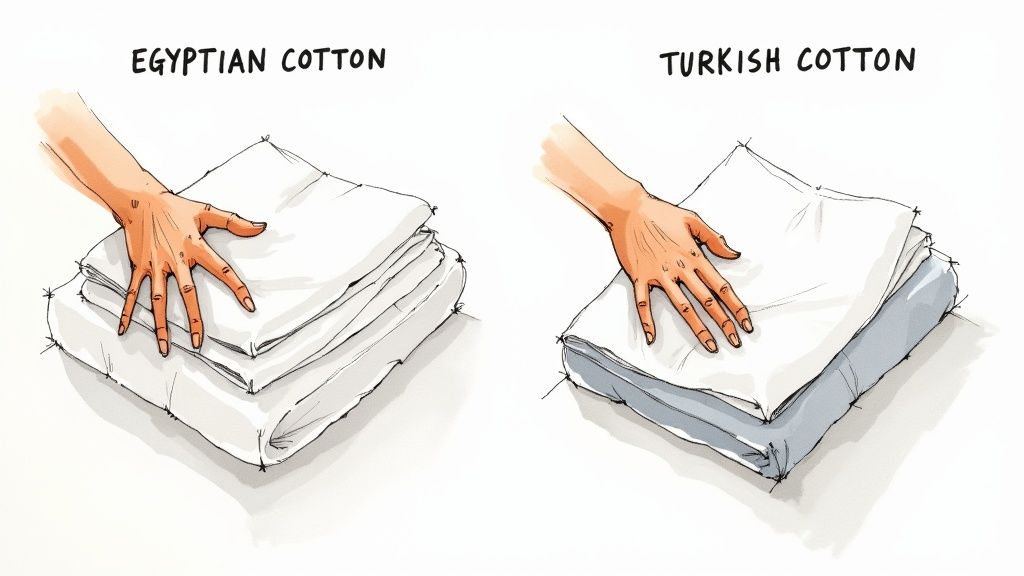
This is where your own experience with each fabric will start to diverge. While Egyptian cotton feels incredibly plush and luxurious right away, its phenomenal absorbency means it hangs onto water for a long time. If you live in a humid climate or have a bathroom without great ventilation, you might find yourself with a towel that stays damp, feels heavy, and can even start to smell musty.
Turkish cotton, on the other hand, turns its lower absorbency into a huge practical advantage. It gets you dry quickly and then, more importantly, it dries itself out surprisingly fast. This makes it the perfect go-to for daily bath towels that get a lot of use, as that quick-drying quality is key to keeping mildew at bay and staying fresh.
How They Age Over Time
Both cottons have a reputation for getting better with age, but they go about it in different ways. Thanks to its extra-long staple fibers, Egyptian cotton starts out incredibly soft and just keeps getting better. Each wash causes the fibers to gently bloom, making the fabric even silkier and more supple. It’ll maintain that smooth, luxurious feel for years without pilling.
Turkish cotton also softens up beautifully with washing, but it evolves from a flat, smooth textile into something wonderfully soft and fluffy. It develops a cozy, lived-in texture that boosts its comfort without weighing it down. This graceful aging process makes it a true workhorse for anything that needs frequent washing, like the family's bath towels or your favorite kitchen linens.
When you're thinking about longevity, Egyptian cotton is the clear winner for items that don’t see a lot of friction, like bed sheets. But for items that need to stand up to constant, heavy-duty washing, high-quality Turkish cotton is exceptionally resilient.
The global cotton towel market really highlights these distinct performance qualities. Egyptian cotton commands a massive 43.32% market share in the towel segment, largely because people are willing to invest in its high-end absorbency and durability. Even with its longer drying time, the desire for pure luxury keeps its popularity growing. You can dive deeper into these trends in this detailed cotton towel industry analysis.
Practical Use Case Scenarios
The best way to decide is to think about how and where you'll be using the item. It's that simple.
- For the Family Bathroom: Turkish cotton towels are the most practical pick. They can handle being used multiple times a day by different people and will dry out between showers, which means they stay fresher for longer.
- For a Guest Bathroom or Spa Experience: This is where you bring out the Egyptian cotton. Its incredible plushness and absorbency deliver that immediate "wow" factor, giving guests a touch of luxury or elevating your own self-care routine.
- For Bedding: It's almost always Egyptian cotton for the bedroom. Its unmatched softness, breathability, and strength create a sleep environment that’s both incredibly comfortable and built to last.
- For Travel or the Gym: Nothing beats Turkish cotton. It's lightweight, packs down small, and dries in a flash, making it the perfect companion to toss in a suitcase or gym bag.
Which Cotton Is Right for Your Home?
So, Turkish or Egyptian? The truth is, there's no single "winner." The best choice really comes down to what you're buying and how you plan to use it. Think of it less like a competition and more like picking the right tool for the job. Once you know what each cotton excels at, you can pick the perfect product to elevate your daily routine.
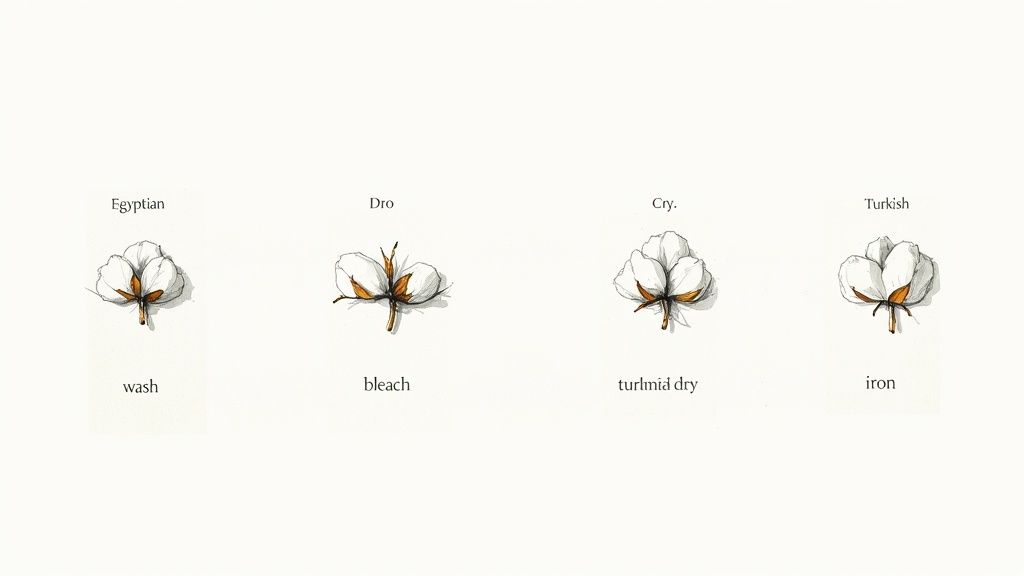
Let's move past the technical specs and get into practical advice for your home.
For Luxurious Bedding
When it comes to sheets, pillowcases, and duvet covers, nothing beats the feeling of slipping into a truly comfortable bed. For that reason, Egyptian cotton is the superior choice for bedding. Its extra-long staple fibers are spun into incredibly fine, strong yarns that produce a fabric that's exceptionally smooth, silky, and breathable.
Egyptian cotton's dense weave and silky fibers provide a truly luxurious sleep experience that is difficult to replicate. It drapes beautifully and feels cool and crisp against the skin.
This focus on a luxurious feel and impressive durability means your bedding won't just feel amazing on night one—it will get even softer over years of use and washing.
For Everyday Bath Towels
In the bathroom, the debate gets a little more interesting. For the towels you reach for every single day, Turkish cotton is the most practical and efficient option. Its main advantage is how quickly it dries. This is a game-changer in humid bathrooms, as it helps prevent that dreaded mildew smell and keeps towels feeling fresh.
They are perfectly absorbent for drying off after a shower but won't get waterlogged and heavy like some ultra-plush towels can. This makes them perfect for busy families, gym bags, and anyone who needs a towel that’s ready to go again quickly.
Of course, if you're aiming for that five-star hotel, spa-like feel and have plenty of time for towels to air dry, then the supreme absorbency of an Egyptian cotton towel is pure indulgence.
For Robes and Beachwear
For items that you wear or take on the go—think bathrobes, kaftans, and beach towels—Turkish cotton is the clear winner in this category. Its lighter weight and quick-drying nature are exactly what you need.
A Turkish cotton robe feels comfortable and airy, never heavy or clingy. A Turkish beach towel is a traveler's dream: it's easy to pack, shakes sand off easily, and dries in a flash under the sun.
Making an informed purchase also means thinking about the bigger picture. The environmental impact of textiles is an important consideration, and you can learn more about what goes into sustainable production and how eco-friendly cotton can be.
Caring for Your Premium Cotton Textiles
When you invest in high-quality textiles like Turkish or Egyptian cotton, a little bit of care goes a long way in protecting that investment. The goal is to preserve the unique characteristics that made you choose them in the first place—the softness, the absorbency, and the incredible durability. Get it right, and these pieces will feel amazing for years to come.
First things first: turn down the heat. Always wash your cotton in cool or warm water, as hot water is the enemy of natural fibers. It causes them to weaken and shrink over time, which is the last thing you want for your luxurious linens or towels. Stick to the gentle cycle, too; it's all about minimizing stress on the fabric.
Washing and Drying Best Practices
When you reach for the detergent, remember that less is definitely more. A mild, liquid detergent is all you need. Steer clear of fabric softeners and dryer sheets completely. They work by coating the fibers with a waxy residue, which might feel soft initially but actually destroys absorbency—a real performance killer, especially for those wonderfully thirsty Turkish towels.
The best way to dry them? Let nature do the work. Line drying is incredibly gentle and helps the fibers stay strong and intact. If you're short on time and need to use a machine, just be sure to tumble dry on a low heat setting. Pull everything out while it’s still just a little damp to prevent that stiff, over-dried feeling.
Here's a pro tip I swear by for keeping towels fluffy: give them a vigorous shake right out of the washer and again before you fold them from the dryer. It's a simple, chemical-free trick that helps open up the cotton loops, restoring that plush, lofty feel.
These care principles aren't just for towels; they're solid practices for all high-end cotton. For some great general tips, this expert advice on washing cotton shirts translates perfectly to other premium textiles. And if you have Turkish towels specifically, our in-depth guide on how to care for your Turkish towel has everything you need to know to keep them in peak condition.
Your Questions, Answered
Even after comparing them side-by-side, you might still have a few lingering questions about which cotton is right for you. Let's tackle some of the most common ones I hear.
Is One Cotton Better for Sensitive Skin?
Honestly, you can't go wrong with either if you're buying high-quality, certified cotton. Both are natural, breathable fibers, and if you find a product with an OEKO-TEX certification, you know it's free of nasty chemicals.
That said, if we're splitting hairs, Egyptian cotton sometimes has a slight edge for those with extreme skin sensitivity. Its extra-long, silky fibers create a fabric with virtually zero texture, which can feel exceptionally smooth against irritated skin.
How Can I Tell if It's the Real Deal?
Great question. Authenticity is everything. For genuine Egyptian cotton, keep an eye out for the official Cotton Egypt Association trademark—it looks like a white cotton boll inside a black pyramid. With Turkish cotton, look for labels that specify it's made in Turkey, often mentioning "Aegean cotton." The most important thing? Buy from brands that are open and proud about where their cotton comes from.
A quick tip: Watch out for sneaky blends. A label might say "Made with Egyptian cotton," but it could be just a tiny fraction of the blend. True luxury goods will be clearly marked as 100% Egyptian or Turkish cotton.
Why Does Egyptian Cotton Cost So Much More?
It really comes down to a few key things: rarity, labor, and quality. Egyptian cotton is picky—it only grows to its full potential in a very specific climate along the Nile, which limits the global supply.
On top of that, it’s traditionally hand-picked. This careful process protects the long, delicate fibers from the damage machine harvesting can cause. You're paying for a more meticulous process that results in a stronger, softer, and more durable yarn.
Do Turkish Towels Really Get More Absorbent?
Yes, they absolutely do, and it's one of their best qualities! While they might not feel as plush as an Egyptian towel right out of the package, Turkish towels truly come into their own with a little use.
Each time you wash them, the long fibers bloom, or fluff up, which increases their surface area and makes them progressively thirstier. You get improved absorbency without losing that amazing quick-dry capability, so they just get better and better.
Ready to experience the perfect blend of softness and quick-drying practicality? Anatolico offers artisan-crafted textiles made for modern living. Take a look at our collection of authentic Turkish towels, robes, and home goods. Shop the collection at anatolico.co.

